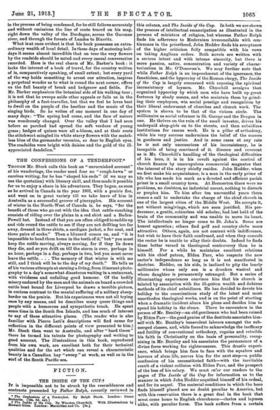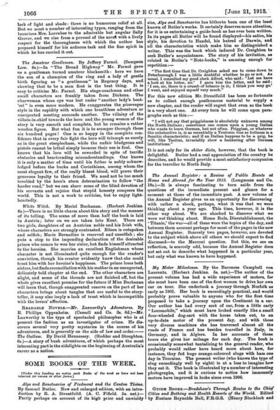FICTION.
THE INSIDE OF THE CUP.t
IT is impossible not to be struck by the resemblances and contrasts presented by Father Ralph, recently reviewed in • The Corssions of a Tenderfoot. By Ralph Stock. London : Grant Richards_ 10s. 6d. net.] t The made of the Cup. By Winston Churchill. With Illustrations by Howard Giles. London : Macmillan and Co. [6s.] this column, and The Inside of the Cup. In both we are shown the process of intellectual emancipation as illustrated in the persons of ministers of religion, but whereas Father Ralph finds his adherence to Modernism irreconcilable with con- tinuance in the priesthood, John Hodder finds his acceptance of the higher criticism fully compatible with his vows on taking Anglican orders. Both novels are written with a serious intent and with intense sincerity, but there is more passion, satire, concentration and variety of charac- terization in Mr. O'Donovan's. We may further note that while Father Ralph is an impeachment of the ignorance, the fanaticism, and the hypocrisy of the Roman clergy, The Inside of the Cup is largely concerned with exposing the spiritual inconsistency of laymen. Mr. Churchill arraigns that organized hypocrisy by which men who have built up great fortunes by shady means, and who maintain them by grind- ing their employees, win social prestige and recognition by their liberal endowment of churches and church work. The system is shown to be that of the vicious circle. The millionaire as social reformer is St. George and the Dragon in one. He thrives on the ruin of the small investor, drives his underpaid shop-girls on to the streets, and then subsidizes institutions for rescue work. He is a pillar of orthodoxy, while his very success undermines the belief of the masses in goodness and justice. And in some cases at any rate he is not only unconscious of his inconsistency, he is incapable of being convinced of it. Sincere and reverent as is Mr. Churchill's handling of the theological difficulties of his hero, it is in his revolt against the control of church finance by unscrupulous commercial magnates that the interest of the story chiefly resides. John Hodder, when we first make his acquaintance, is a man in the early prime of life who has made his mark as a devoted and efficient parish priest in a small country town. At Bremerton there were no problems, no doubters, no industrial unrest, nothing to disturb or perplex him. To him after ten uneventful years there comes a call to undertake the charge of the chief church in one of the largest cities of the Middle West. He accepts it, not without misgivings, which are soon justified. His pre- decessor, a gentle, colourless old scholar, had lost bold of the brain of the community and was unable to move its heart. The intellectuals no longer come to St. John's. Some are honest agnostics ; others find golf and country clubs more attractive. Others, again, are not content with indifference, but wish to have their faith confirmed, and when they consult the rector he is unable to allay their doubts. Indeed he finds them better versed in theological controversy than he is himself. For a while he maintains excellent relations with his chief patron, Eldon Parr, who respects the new rector's independence so long as it is not manifested in doctrine. Hodder, on his side, is inclined to pity the lonely millionaire whose only son is a drunken wastrel and whose daughter is permanently estranged. But a series of illuminating experiences convince him that his church is tainted by association with the ill-gotten wealth and dubious methods of its chief subsidizers. He has decided to devote his holiday to the conscientious study of the latest and most unorthodox theological works, and is on the point of starting when a dramatic incident alters his plans and decides him to spend his holiday in the slums. There he encounters in the person of Mr. Bentley—an old gentleman who had been ruined by Eldon Parr—the good genius of the destitute associates him- self with Mr. Bentley's benevolent labours amongst the sub- merged classes, and, while forced to acknowledge the inefficacy and futility of conventional orthodoxy, regains and rebuilds his faith in Christianity on the basis of personality, recog- nizing in Mr. Bentley and his associates the permanence of a divine force working for righteousness. This drastic experi- ence, which brings him face to face with the squalors and horrors of slum life, nerves him for the next step—a public confession of his reconstituted faith—with the inevitable result of a violent collision with Eldon Parr, and the prospect of the loss of his salary. We must reeer our readers to the pages of The Inside of the Cup for information as to the manner in which John Hodder acquitted himself of his ordeal, and for its sequel. The material conditions in which the hero finds himself placed are no doubt peculiar to America, but with this reservation there is a great deal in the book that must come home to English churchmen—clerics and laymen alike, with peculiar force. The book suffers from a certain
lack of light and shade : there is no humorous relief at all. But we meet a number of interesting types, ranging from the luxurious Mrs. Larrabee to the admirable but angular Sally Grover, and we rise from a perusal of the novel with a lively respect for the thoroughness with which the author has prepared himself for his arduous task and the fine spirit in *which be has carried it out.











































 Previous page
Previous page